Interview With JICA’s Tanaka Tomoaki: Bridging Practice and Policy for Evidence-based Policy Making
2025.07.18
Tanaka Tomoaki, a JICA staff member, has found that the challenges he encounters in developing countries can become fertile ground for academic research. With a background in economics, Tanaka leads multiple research projects, including one on the barriers to pension participation in Mongolia. We asked Tanaka about the significance of continuing research while participating in practical development work on the ground and the passion that drives him.
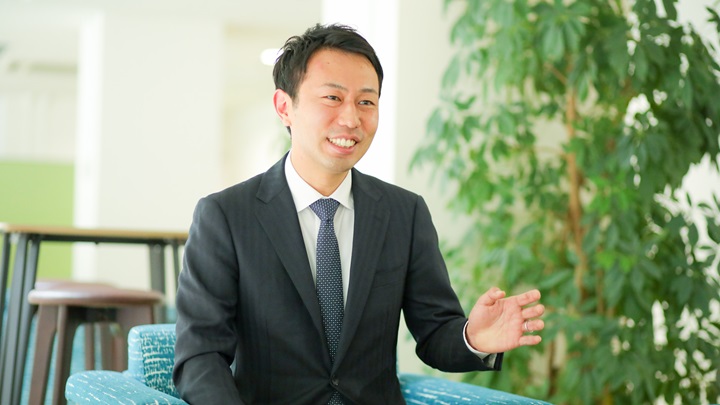
―Since joining JICA, you’ve held positions in departments such as the Evaluation Department, JICA Mongolia Office, and the Credit Risk Analysis and Environmental Review Department. What led you to get involved in research activities while working in these roles?
As an undergraduate and as a graduate student, I studied economics. I became particularly interested in public and economic policy in areas like public finance and social security. Back then, I had the option to pursue an academic path and develop my expertise, but I felt that I wanted to be closer to what was happening on the ground and do work that would have a direct impact on people’s lives. Thus, I joined JICA.
The desire to develop my expertise and produce tangible results has remained with me throughout my career. When I heard that the JICA Ogata Sadako Research Institute for Peace and Development (JICA Ogata Research Institute) had launched a call for research proposals* in 2014, I decided to take on the challenge of engaging in both practical and research work at the same time. The timing was fortunate as I was assigned to the JICA Mongolia Office in 2015. Hands-on experience with on-the-ground challenges sparked my curiosity and became the driving force to my successfully conducting both on-the-ground and research work.
*Call for research proposals with the objectives of gaining insight into various development challenges and strengthening the research capacity of JICA staff. The JICA staff in charge of the research work in the accepted proposals will conduct research and draft academic papers as part of their job, while receiving advice from researchers at the JICA Ogata Research Institute and external scholars.
―How did you decide on your research topic?
In the JICA Mongolia Office, as a staff member in charge of social security-related matters, I was involved in the Project on Strengthening the Capacity for Social Insurance Operations (available only in Japanese) , which aimed to improve capacity of social insurance operations in Mongolia. While participation in the Mongolian pension scheme is voluntary for workers in the informal sector such as nomadic herders and farmers, the Mongolian government has been working to improve their participation. Thus, together with Mongolian government officers and experts, we interviewed nomadic herders and gathered direct feedback from them. The herders often said that although they would like to participate in the pension scheme, it was challenging to maintain consistent monthly payments due to their seasonal fluctuations in income. Others said that it was hard to travel to towns far from where they live to make contribution payments.
During long bumpy car rides on rough unpaved roads to visit rural areas, it struck me that these challenges could be addressed not only through development projects but also through research. Many hypotheses came into my mind. Could there be other reasons in addition to financial ones behind the people’s hesitance to participate in the pension scheme? Is the lack of trust in the government also a barrier? The people of Mongolia experienced great upheaval during the country’s transition from socialism to capitalism in the 1990s. Meanwhile, participation in a pension scheme is a long-term investment. I therefore came to believe that a lack of trust in the government could be a bottleneck.
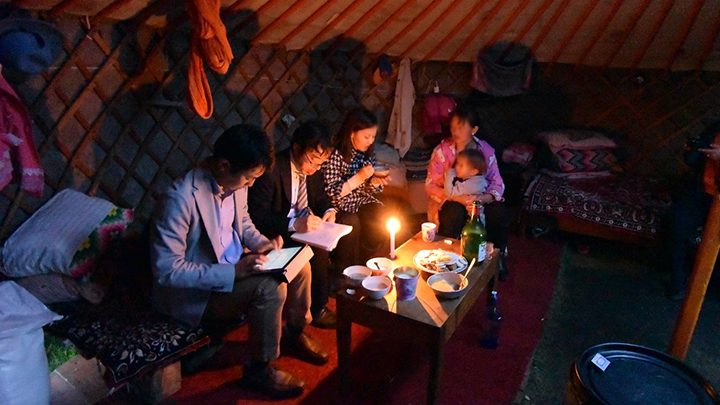
An interview with nomadic herders in Mongolia
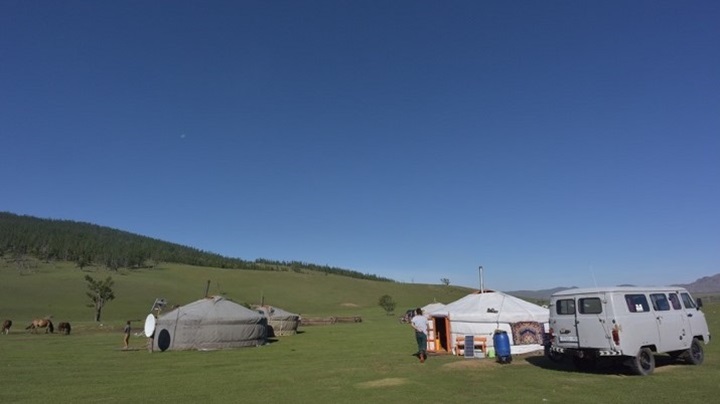
Mongolian nomadic herders living in Gers
―How did you move forward with your research? Please share the outcomes with us.
After developing an initial research idea following interviews with Mongolian nomadic herders, I looked through existing academic papers. I found that while some empirical research on pension participation had been conducted in developed countries, there was relatively little research in developing countries. This gap made the topic particularly compelling. I therefore decided to explore the barriers to pension participation among Mongolian nomadic herders using experimental methods and submitted a research proposal to the JICA Ogata Research Institute. This is how this research project started.
Upon launching the project, I asked for help and set up a research team comprising: Sawada Yasuyuki , Visting Fellow, JICA Ogata Research Institute (also Professor, University of Tokyo), who taught me when I was a graduate student; Yamasaki Junichi, Associate Professor, Kyoto University, my former classmate from graduate school (who had a position at Kobe University at the time of working on this research); and Dovchinsuren Khaliun from Mongolia, who was a member of an undergraduate research group led by Sawada at the Faculty of Economics, University of Tokyo at the time, and later went on to study at graduate school (currently working at the Credit Risk Database Association and the National University of Mongolia). In this team we refined our hypothesis, discussed our research methodology, and developed our data analysis plan.
Eventually, we conducted a large-scale survey in Mongolia. With the help of Mongolian ministries, experts of development projects and local staff at the JICA Mongolia Office, we distributed questionnaires along with explanatory leaflets on the Mongolian pension scheme. The survey covered 690 baghs (the smallest administrative unit) spanning around one-third of the country. To see what kind of explanation in the leaflets would be effective in encouraging contribution payments we randomly distributed four different types of leaflets. The first type consisted only of an overview of the Mongolian pension scheme. The other three included one of the following in addition to the overview: explanation of disability and survivors’ pensions, an outline of JICA’s project to improve the pension administration in Mongolia, or information on how to make contribution payments using mobile phones.
However, given that Mongolia is about four times the size of Japan, it was impossible to visit each bagh by myself. We therefore got help from the subdistrict governors who were kind enough to conduct the survey on behalf of us. They are in charge of administrative services. Would we be able to collect the completed questionnaire forms? Would the survey respondents actually fill them out? We did our best, such as providing a manual document and a tutorial video on the survey. In total we received responses from 616 baghs. I remember being so relieved when boxes full of completed questionnaire forms kept on arriving. Some of the forms were covered with mud and I was touched to see that the respondents had worked so hard to respond.
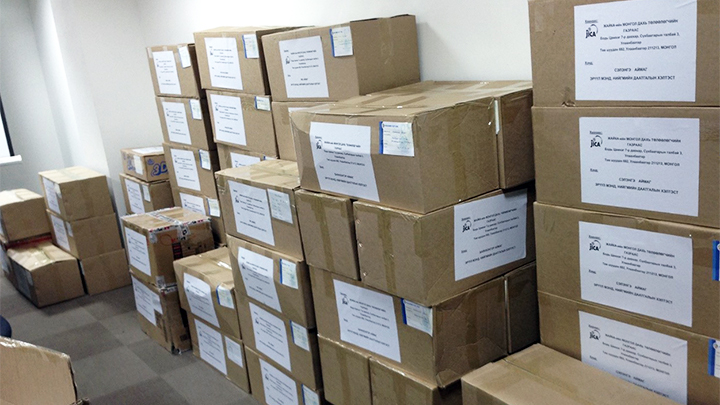
Survey materials ready to be sent to 690 baghs
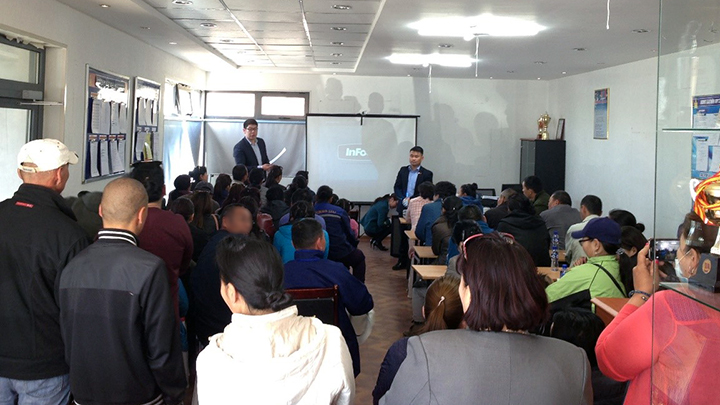
A town meeting is held regarding the survey
When we analyzed the responses, we saw that contribution payments were encouraged when the leaflets included information about either JICA’s project or mobile payment methods. In other words, we had confirmed the existence of two key barriers to pension participation: a lack of trust in the pension scheme and difficulty with payment methods. As JICA’s Project on Strengthening the Capacity for Social Insurance Operation to make pension administration improvements was designed to build trust in the pension scheme in Mongolia, our research provided concrete evidence supporting the significance of that project.
― A paper on the findings of this research in Mongolia, “ Barriers to Saving for Retirement: Evidence from a Public Pension Program in Mongolia ,” was accepted by the Journal of Political Economy Microeconomics. This new journal is tied closely to the Journal of Political Economy, which is one of the oldest and most prestigious academic journals in the field of economics. Building on this achievement, how do you plan to continue successfully conducting both on-the-ground work and research work?
I’m glad that our paper has been published in such a highly regarded international journal. The research team carefully reviewed every detail of the analysis, and the members gave me invaluable advice on paper writing and data analysis. I learned a great deal from this experience. I am also truly grateful to our Mongolian counterparts, experts of development projects, staff members at the JICA Mongolia Office and many other people for their help. I hope that this paper will inspire other economists to take an interest in pension-related issues in developing countries and start new studies in this area.
We conducted the survey in Mongolia in 2017, analyzed the data in 2018 and the paper was published in 2025—academic research takes time. However, the situation on the ground evolves quickly, so we continued to share tentative data analysis results with the Mongolian government during this period. As a result, the government has since developed an app that allows users to view their social insurance records and has also implemented a service to facilitate easier contribution payments. I believe our research played a role in encouraging these developments.
Furthermore, while we had already intuitively known that lack of trust is a bottleneck preventing nomadic herders from participating in the pension scheme, I think that by presenting evidence through research work we can pave the way for concrete policies to address this issue. Indeed, we recently received an inquiry on our paper from a World Bank economist specializing in pensions. This underscores how research grounded in fieldwork can lead directly to policy impact—this is the true value of conducting academic research in tandem with practical work.
―What are your future prospects, including research you are planning next?
I will continue to analyze the effects of changes made to pension systems in Mongolia. I would also like to analyze the behavioral changes that result from pension participation. On another note, while our research started in Mongolia, population aging is a global phenomenon. By 2050, the number of people aged 65 and above is expected to double from 2019. This will make the sustainability of pension schemes a big challenge around the world. Therefore, I am now working with World Bank economists on a study of pension systems across all developing countries.
The ability to conduct practical operation and research activities in parallel is a great advantage for JICA, an organization that works on the ground. For me, it makes work incredibly rewarding and intellectually stimulating. You can find research subjects because you know how things are on the ground. I would like to continue to conduct research that is grounded in real-world experience, so I can contribute to policy and ultimately give back to the communities that I work with.
Tanaka Tomoaki
Tanaka conducts macroeconomic analyses of countries around the world at the Credit Risk Analysis and Environmental Review Department of JICA. He is also currently conducting research in the PhD (Economics) program at Queen Mary University of London. A member of JICA since 2011, Tanaka has worked in the Evaluation Department, the Industrial Development and Public Policy Department, JICA Mongolia Office, the Treasury, Finance and Accounting Department, and the JICA Ogata Research Institute. Tanaka was the winner of the fourth Hayami Award of the Japanese Association for Development Economics.

事業事前評価表(地球規模課題対応国際科学技術協力(SATREPS)).国際協力機構 地球環境部 . 防災第一チーム. 1.案件名.国 名: フィリピン共和国.

事業事前評価表(地球規模課題対応国際科学技術協力(SATREPS)).国際協力機構 地球環境部 . 防災第一チーム. 1.案件名.国 名: フィリピン共和国.

事業事前評価表(地球規模課題対応国際科学技術協力(SATREPS)).国際協力機構 地球環境部 . 防災第一チーム. 1.案件名.国 名: フィリピン共和国.

事業事前評価表(地球規模課題対応国際科学技術協力(SATREPS)).国際協力機構 地球環境部 . 防災第一チーム. 1.案件名.国 名: フィリピン共和国.

事業事前評価表(地球規模課題対応国際科学技術協力(SATREPS)).国際協力機構 地球環境部 . 防災第一チーム. 1.案件名.国 名: フィリピン共和国.
scroll